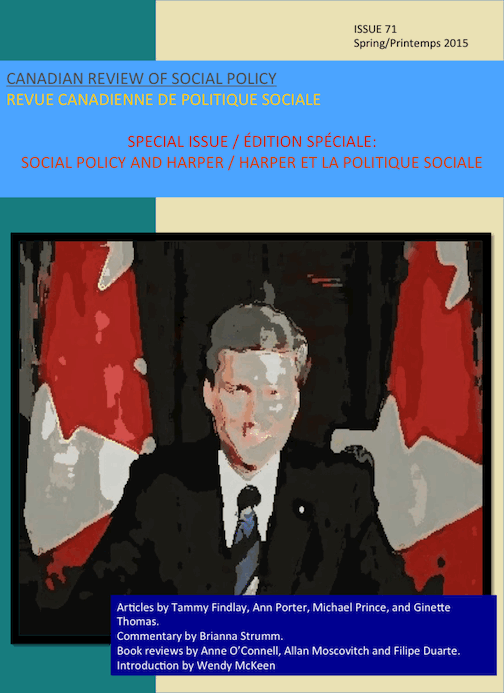Women in Harperland: A Critical Look at Gender Inequality in Canada Since 2006
Keywords:
Gender inequality, violence against women, pay inequity, social policy, childcareAbstract
This paper critically examines and summarizes the facts on gender inequality under Stephen Harper’s Conservative government. Since Stephen Harper’s election in 2006, arguably, women’s economic and social well being has weakened, therefore increasing gender inequality in Canada. This paper briefly discusses current national trends with regards to pay inequity, precarious employment options, income splitting, social infrastructure such as childcare and the Universal Child Care Benefit (UCCB) and lastly, violence against women. This paper additionally argues that with the near disappearance of the Status of Women Canada’s mandate, women are being written out of the national story; currently, the budget for Status of Women Canada amounts to a mere 0.03% of direct federal program spending (McInturff, 2014). The Royal Commission on the Status of Women took place nearly 45 years ago and another wide-sweeping, national look at women’s lives in Canada is again required to ensure equality and the full participation of women in the 21st century. Proper attention to women’s issues and gender equality is a matter of fairness. Non-discrimination is a Charter-guaranteed right for women in Canada. Cet artticle examine et résume de façon critique les réalités sur l’inégalité entre les genres sous le gouvernement conservateur de Stephen Harper. Le bien-être économique et social des femmes s’est affaibli depuis l’entrée au pouvoir de Stephen Harper en 2006, ce qui a eu comme résultat d’augmenter l’inégalité entre les genres au Canada. Cet article discute brièvement des tendances nationales en ce qui a trait à la disparité salariale, aux conditions précaires d’emploi, à la séparation des revenus, et aux infrastructures sociales telles la garde des enfants, et la prestation universelle pour la garde des enfants (PUGE), et finalement, la violence envers les femmes. De plus, cet article propose qu’avec la quasi-disparition du mandat de la condition féminine Canada, les femmes sont en train d’être supprimées de l’histoire nationale. Présentement, le budget annuel de la condition féminine Canada est à peine 0.03% des dépenses directes fédérales de programmes sociaux (McInturff, 2014). La commission royale sur le statut des femmes a pris place il y a plus de 45 ans, et il semblerait qu’un autre regard national et général sur la vie des femmes canadiennes est de nouveau de mise afin de garantir la participation totale des femmes au 21ième siècle. Les problématiques des femmes et de l’égalité entre les genres sont des questions d’équité, et la non-discrimination est un droit garanti par la charte des droits humains au Canada. Mots-Clefs: Inégalités entre les genres; violence envers les femmes; disparité salariale; garde des enfantsDownloads
Published
How to Cite
Issue
Section
License
1-The author guarantees that the manuscript is an original work not published elsewhere in print or electronically in whole or in part, except in abstract form, that the author has the full power to make this contribution, and that the manuscript contains no matter libelous or otherwise unlawful or which invades the right of privacy or which infringes any proprietary right.
2-The author guarantees that the manuscript has not been previously published in print or electronically and that if the manuscript contains any tables, figures or images fully reproduced or closely adapted from previously published material, the author must obtain the necessary permission from the author/publisher holding the original copyright prior to publication in CRSP. The author may be required to produce evidence of permission granted to CRSP’s editors.
3-As a condition of publication in CRSP, the author assigns all copyright to CRSP, including but not limited to the right to publish, republish, and otherwise distribute this manuscript in print, electronic, or other formats. As CRSP is a non-profit interdisciplinary scholarly journal, the author will receive no royalty or other monetary compensation for the assignment set forth in this agreement.
For the purpose of full disclosure, CRSP will not normally use the content provided by the author in a commercial venture, but for the purpose of disseminating the author’s content to as many readers as possible. For distribution, third parties engaging in commercial activities may be contracted to distribute the content globally, and such parties may make a profit out of the author’s content in their normal course of business. CRSP will not pay the author or reimburse the author in any form based on such commercial activities because the conduct of such commercial activities is outside the control of CRSP.
Any future reference to or use of this published material by the authors must acknowledge CRSP as the original place of publication.
PERMISSION REQUEST/ARCHIVING
Permission is given to author(s) receiving funding via Tri-Council Agencies, the Canadian Institutes of Health Research (CIHR), the Natural Sciences and Engineering Research Council of Canada (NSERC) and the Social Sciences and Humanities Research Council (SSHRC), to make their publications freely available in an Open Access repository within the stated deadline by the Tri-Council Agencies (12 months following publication). Archiving of publication must be a manuscript copy bearing none of the CRSP headers, footers or any other distinguishing marks. No links to the article on the CRSP website is permitted.
Permission requests from third parties to reproduce articles in part or full in academic/educational publications can be directed to the managing editor of CRSP, and will not be unreasonably denied.

